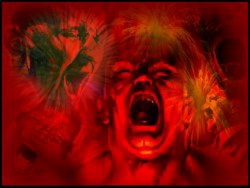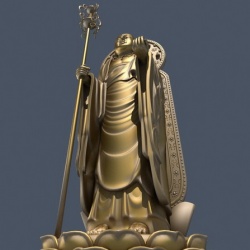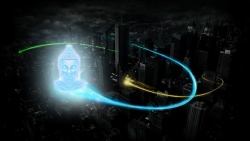Anger
- See also :
- See also :
Anger in Buddhism is defined here as: "being unable to bear the object, or the intention to cause harm to the object." Anger is seen as aversion with a stronger exaggeration, and is listed as one of the five hindrances. Buddhist monks, such as Dalai Lama, the spiritual leader of Tibetans in exile, sometimes get angry. However, there is a difference; most often a spiritual person is aware of the emotion and the way it can be handled. Thus, in response to the question: "Is any anger acceptable in Buddhism?' the Dalai Lama answered:
- Buddhism in general teaches that anger is a destructive emotion and although anger might have some positive effects in terms of survival or moral outrage, I do not accept that anger of any kind as a virtuous emotion nor aggression as constructive behavior. The Gautama Buddha has taught that there are three basic kleshas at the root of samsara (bondage, illusion) and the vicious cycle of rebirth. These are greed, hatred, and delusion — also translatable as attachment, anger, and ignorance. They bring us confusion and misery rather than peace, happiness, and fulfillment. It is in our own self-interest to purify and transform them.
Buddhist scholar and author Geshe Kelsang Gyatso has also explained Buddha's teaching on the spiritual imperative to identify anger and overcome it by transforming difficulties:
- When things go wrong in our life and we encounter difficult situations, we tend to regard the situation itself as our problem, but in reality whatever problems we experience come from the side of the mind. If we responded to difficult situations with a positive or peaceful mind they would not be problems for us. Eventually, we might even regard them as challenges or opportunities for growth and development. Problems arise only if we respond to difficulties with a negative state of mind. Therefore if we want to be free from problems, we must transform our mind.
- An angry person is ugly & sleeps poorly. Gaining a profit, he turns it into a loss, having done damage with word & deed. A person overwhelmed with anger destroys his wealth. Maddened with anger, he destroys his status. Relatives, friends, & colleagues avoid him. Anger brings loss. Anger inflames the mind. He doesn't realize that his danger is born from within. An angry person doesn't know his own benefit. An angry person doesn't see the Dharma. A man conquered by anger is in a mass of darkness. He takes pleasure in bad deeds as if they were good, but later, when his anger is gone, he suffers as if burned with fire. He is spoiled, blotted out, like fire enveloped in smoke. When anger spreads, when a man becomes angry, he has no shame, no fear of evil, is not respectful in speech. For a person overcome with anger, nothing gives light.
Source
anger
瞋恚・瞋 (Skt dvesha; Pali dosa; Jpn shinni or shin )
In Buddhism, one of the three poisons, or three sources of vice and suffering, the other two being greed and foolishness. In Buddhism, anger refers particularly to malice born of hatred and is regarded as a great obstacle to Buddhist practice. It is seen as preventing one's heart from turning to goodness and as destroying the good roots of benefit accumulated through Buddhist practice. T'ient'ai (538-597) says in The Words and Phrases of the Lotus Sutra, "Because anger increases in intensity, armed strife occurs." Buddhism emphasizes the practice of compassion and forbearance.
See also dvesha.
Source
A deluded mental factor that observes its contaminated object, exaggerates its bad qualities, considers it to be undesirable, and wishes to harm it.
the emotion of instant displeasure on account of something evil that presents itself to our view. In itself it is an original susceptibility of our nature, just as love is, and is not necessarily sinful. It may, however, become sinful when causeless, or excessive, or protracted ( Matthew 5:22 ; Ephesians 4:26 ; Colossians 3:8 ). As ascribed to God, it merely denotes his displeasure with sin and with sinners ( Psalms 7:11 ).
Source
Anger (kodha) is the feeling of negativity experienced when one’s desires are frustrated. The Buddha said that because of anger’s ability to churn up the mind anger is one of the most destructive of all human emotions. Buddhist psychology recognises numerous expressions and intensities of anger – mild irritation, annoyance, bad temperedness, exasperation, resentment, umbrage, fury etc, and offers a wide variety of techniques to deal with it. It is of course, necessary to hold anger in check but beyond that one has to deal with its roots. There is a strong relationship between anger and desire – the stronger our desire, the angrier we get when that desire is frustrated. Thus, the first step in coming to terms with anger is modifying desires. Anger will, however, only be completely eliminated when the ego or sense of self is understood.
Releasing Anger
In 1995, Daniel Goleman, published the best-seller, Emotional Intelligence.In this book he showed that more than intellectual intelligence, such as I.Q., what is a far greater scale of a person’s success is how well they deal with social and emotional issues. Emotional intelligence refers to getting along with others, knowing how and when to act, not letting things bother you, and success features, such as persistence, determination, and deferred gratification.
Dr. Goleman provides references from many studies to show the importance of the emotional skills for success. He explains how even residual amounts of anger (which some people feel are necessary toget theanger“off your chest”) leads to further, escalated anger. A person even with a small amount of anger can enter a “flooding” state, where there is an overwhelming amount of anger with adrenaline, where no rational decisions can be made in this state and it needs a long recovery time before settling down.Many people who have killed loved ones report that they “just snapped” in the heat of some arguments.(Goleman, 1995)
References
- Curbing Anger, Spreading Love. Bhikkhu Visuddhacara, 1992.
- Emotional Intelligence. Daniel Goleman, 1995.
- The Complete Book of Buddha's Lists -- Explained. David N. Snyder, Ph.D., 2006.
External Links
Source
Anger (Kodha) is the Feeling of negativity experienced when one’s desires are frustrated. The Buddha said that because of anger’s ability to churn up the Mind, it is one of the most destructive of all human emotions. In the Saundrānandakāvya, Aśvaghoṣa says, ‘Another person in this World may not be harmed by a Mind of hateful intentions, but the person with such a Mind is burned up immediately. Therefore, you should choose Love and Compassion towards all living creatures, rather than hatred and aggression.’
Buddhist psychology recognizes numerous expressions and intensities of anger – mild irritation, annoyance, bad-temperedness, exasperation, fury, resentment, umbrage, etc, and offers a wide variety of techniques to deal with it. It is, of course, necessary to hold anger in check, but beyond that one has to deal with its roots. There is a strong relationship between anger and desire – the stronger our desire, the angrier we get when that desire is frustrated. Thus, the first step in coming to terms with anger is modifying desires. Anger will, however, only be completely eliminated when the ego or sense of self is understood.
Curbing Anger, Spreading Love, Bhikkhu Visuddhacara,1992.






